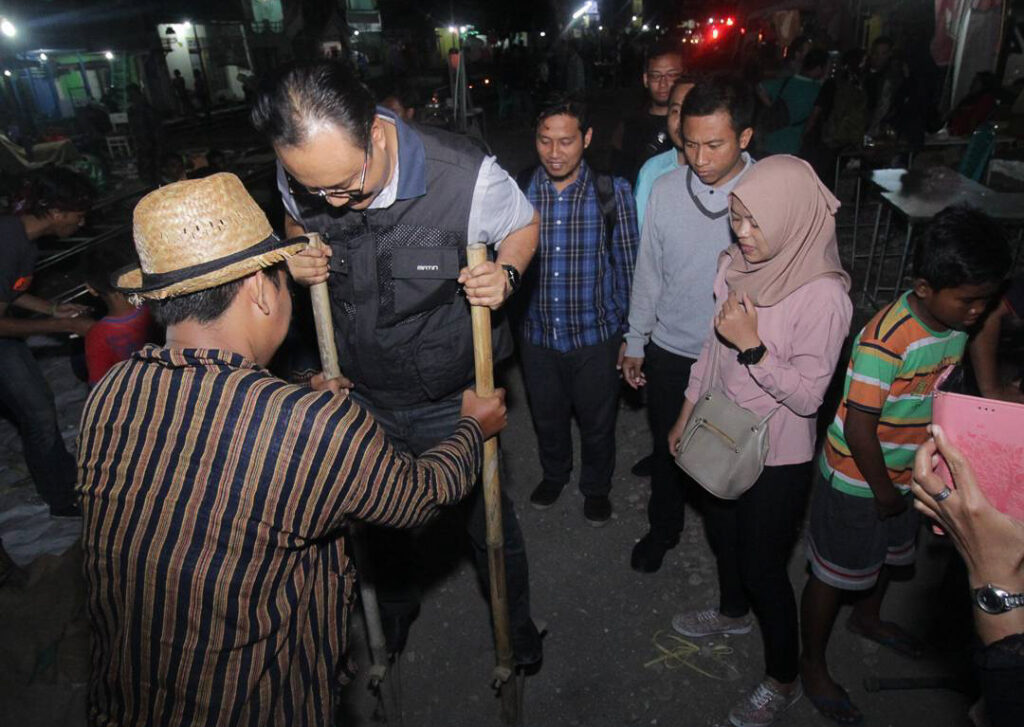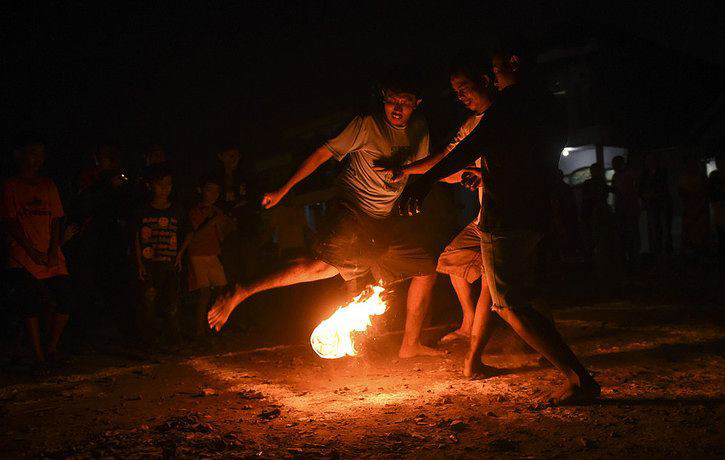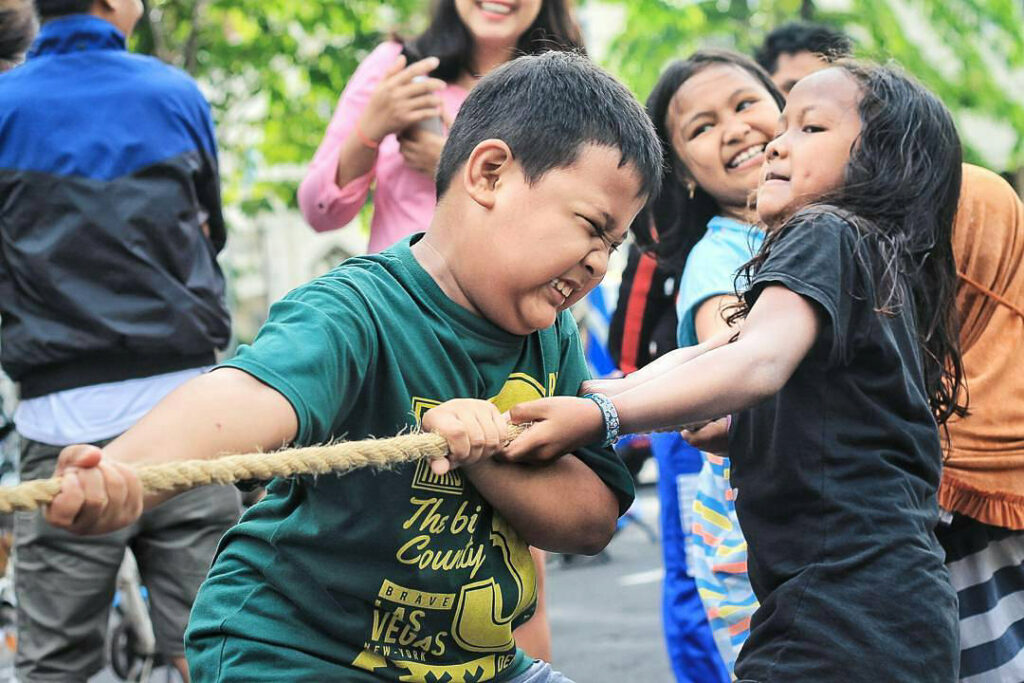
Cublak – cublak suweng, traditional game from Central Java played by 3 – 5 persons accompanied with the same title song during playing.
Janet Teowarang recounts the history of a remarkable Indonesian organisation that seeks to preserve traditional games.
I still vividly remember throughout my childhood when I had the chance to experience Indonesian traditional games. I would play some boys’ games such as kelereng or gundu by using colorful small marbles, gangsing the spinning bamboo, also girls’ games like bekel known as western jacks and congklak or dakon from wooden board and beads as small markers. However, congklak is not originally from Indonesia. It was brought and inspired by Ancient Egypt, the Near East, as this board game is one of the oldest widely known games in the world.
As the world has become increasingly influenced by digital technology, traditional games are being forgotten, regardless of people’s economic status, since most of the current smart devices are affordable, from mobile phones to tablets. However, some cultures or traditions are meant to be preserved by people’s communities or organizations. Kampoeng Dolanan (KD) is one of the great examples of local community efforts to preserve Indonesian traditional games.
The community located in the Kenjeran village, Simokerto Sub-District in Surabaya, the East Java Province of Indonesia, was founded on December 13, 2016, by the local youth organization (karang taruna). Their first initiative was to create a thematic village based on traditional games. Later in 2017, there were 100 individuals registered to become the volunteers of KD batch, one of the community’s partners, to educate new karang taruna for delivering activities outside the village by introducing Indonesian traditional games.
The background of Kampoeng Dolanan itself is unique since it is derived from the ethical mindset when requesting someone or friends to play together. While playing traditional games, there is a deep meaning in cultivating attitudes by portraying an honest approach from the start where, in the future, we will become an honest person. These will apply to vice versa. Since Kampoeng Dolanan is a non-profit community, they have been able to reach out to 100 volunteers each year since 2017, which means at this moment, there are hundreds of volunteers assisting the community to preserve the Indonesian traditional games as cultural heritage. The presence of the volunteers becomes a fuse for the spirit of community movement in introducing Indonesian traditional games to the public. On the spur of the moment, the volunteers have succeeded in introducing traditional games to various regions in Indonesia from the plains of Sumatra to overseas countries such as Singapore, Malaysia and Taiwan.
Last year, in October 2023, I met the founder of Kampoeng Dolanan, Mustofa Sam, who is usually called Cak Mus (Cak is the daily pronouncement for an older brother in East Java Province). This meeting occurred during an event about Indonesian Wayang (a traditional puppet show) made from recycled cement sacks at Universitas Ciputra Surabaya. I became interested in establishing the community when I learned about their recent event, where they showcased their creativity and sustainable mindset by reusing newspapers to create fashion costumes and presenting them with style during the modest fashion showcase in the village. The village is located alongside a railway platform with Sidotopo train station and Sidotopo locomotive depot, which made the area reflect its sense of place.
Just recently, I had the chance to learn further about Kampoeng Dolanan with Cak Mus and talk about the community’s special events, strategy, and future. Throughout the history of Kampoeng Dolanan, Cak Mus has had two memorable activities, where the first in the year 2020, during the pandemic had a roadshow for 19 days around Java island using motorbikes. They brought various Indonesian traditional game products as well as distributed toys purchased from conventional sellers of local traditional games by departing from the North route and returning via the South route. The next memorable activity was another roadshow by motorbike from Surabaya to Lombok and Surabaya to Bali with his family. They brought some toys such as hula hoops, bamboo stilts (Egrang), jumping rope, balogo: a traditional game from Kalimantan, Toekoe Oemar Spel: a traditional game from Aceh based on Teuku Umar, one of Indonesia’s heroes who leads Aceh War against Dutch colonialism in the nineteenth century, Surakarta, a traditional game from Solo, and many others. He acknowledged the activities were exciting and would repeat them in 2023 – 2024 with his wife and child.

Kampoeng Dolanan was visited by Gus Ipul, former Vice Governor of East Java. He was playing a traditional game “Egrang”.
All the Kampoeng Dolanan program activities are decided alongside the main background of the community to maintain the legacy of Indonesian cultural heritage, foster positive habits for children to experience the traditional games with embedded values and philosophies, and also for the children to learn while playing. Throughout this time, Kampoeng Dolanan has produced five game cards protected with Intellectual Property Rights (IPR) as the exclusive rights for the game. This achievement was facilitated and collaborated with various institutions such as local government, the private sector, public society, academics, and the media. On the other hand, Kampoeng Dolanan also assists conventional seller by granting capital and investing in their products (toys) since KD has the sector of social entrepreneurship business–oriented field.
Previously, Cak Mus also lived in the Simokerto Sub-District, where he follows the principle: if you cannot build a large area of Indonesia, then start to create your own small Indonesia where you can begin with your hometown. This is where he started the Kampoeng Dolanan community in the area. The community also has the strategy to increase their community members by creating a village with side-by-side assistance, then there will be a human resource activator and traditional game promoter from that village looking for project-based volunteers in collaboration with the region or nationwide scale university.
Kampoeng Dolanan hopes for the future of sustainable programs and activity by keeping the community mission and vision mandatory to preserve the cultural heritage of the nation’s traditional games as there are 38 provinces in Indonesia. In addition, the Pentahelix model scheme is required to synergize and strengthen the five elements: government, academic, business entity or business owner, society, and community for the leading purpose. Moreover, Kampong Dolanan is also needed to provide child-friendly human resources for giving the comprehension or material equipment about the right parenting style besides educating the children about traditional games.



